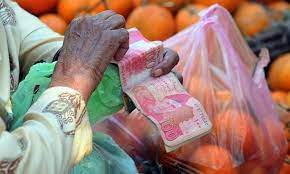
ISLAMABAD, Mar 24 (EW): Citizens across the country are facing the toughest Ramazan this year as hyperinflation coupled with economic slowdown and reduced incomes is restricting their buying power, putting a bar on their daily expenses, especially the consumption of edible commodities, during the holy month.
With the arrival of the month of blessings where prices of commodities fall drastically elsewhere in the world, the rates of supplies in Pakistan multiply, causing misery for the already poverty-stricken nation.
The retailers complained that they received fruits and vegetables at higher rates whereas wholesalers made an excuse of shortage of supplies.
Meeting kitchen expenses, especially for the mediocre and low-income groups during the holy month, became a challenge due to skyrocketing inflation.
Start with pakoras – a Ramazan delight – without which the menu seems to be incomplete and is a favourite of every household.
The price of chickpea flour (besan) – the main ingredient in pakoras – has soared to an unprecedented level. It is being sold between Rs250-300 per kilo as against Rs150-200 last year. If bought readymade from market, pakoras are available at Rs400 per kilo.
The rates of Iranian dates have soared to Rs600 per kilo.
A major jump has been seen in the price of bananas – the main product of fruit chaat (salad). The fruit, which was sold at Rs200 a dozen just a month ago, is now being retailed at Rs500 per dozen.
Chicken meat – the price of which has already shot up several times during the past few months – is now being traded at Rs750-800 per kilo as compared to its earlier rate of Rs650 per kilo. It is expected to cross the price of beef.
Several households prefer buying loose flour because of affordability issues. Most of them buy the commodity on a daily basis.
The availability of loose flour is already scarce in several areas and is being sold at Rs160 per kilo, making it extremely difficult for the breadwinners to feed their families.
A tandoori naan is being sold at Rs30 in some cities whereas in others at Rs40.
Onions, a basic cooking ingredient, is being traded between Rs120-200 per kilo at the retail market as compared to Rs40-80 during last Ramazan.
The fine quality cooking oil is available at around Rs650 per litre against the price of Rs400 last year.
Loose milk rate has increased to Rs210 per litre as compared to Rs150 last year whereas yogurt is being sold between Rs280-300 per kilo against its price of Rs240 previous year.
High-quality basmati rice is being sold at Rs360 per kilo as compared to Rs250 last year.
Surge in the rates of electricity and gas has also added to the citizens’ misery







